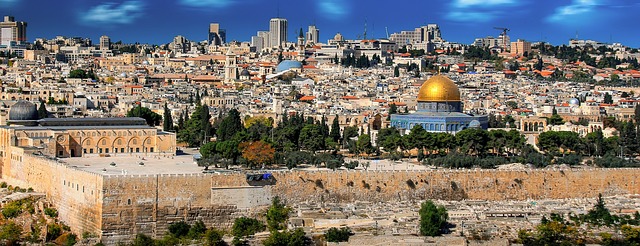
Jerusalem is arguably the most important city in the world. It is certainly the most controversial, most fought-over city in the world. The city, founded 5000 years ago, has been attacked 52 times, captured and recaptured 44 times, besieged 23 times and destroyed twice. During its long history Jerusalem has become an epicenter of three world religions: Judaism, Christianity, and Islam.
Each religion sees Jerusalem as a focus of its religious history and spiritual vision. The city’s history and artifacts are crucially important to the identity of all three religions. Jerusalem is the site of the Wailing Wall, a structural remainder of King Solomon’s Temple, destroyed by the Romans in 70 C.E. On the very same site stands the Dome of the Rock, where Muhammed ascended to Heaven, and Jerusalem is the site of the trial, imprisonment and crucifixion of Jesus Christ.
Political representatives of each of the three religions have fought to get their turns governing Jerusalem. The ancient Israelites controlled Jerusalem from 1000 BCE until 925 BCE, and modern day Israelis have controlled the entire city since 1967. Islamic rulers governed Jerusalem in four different time periods, the first one starting in 649 CE, and the last one ending in 1917. Christians controlled Jerusalem twice during the Crusades.
Clearly Jerusalem is important to all three religions, and adherents of the two non-governing religions are never happy when the city is governed by representatives of the third religion. This is the current situation. West Jerusalem has been controlled by Israel since 1948, and the entire city has been under Israeli control since 1967. However, both Israelis and Palestinians want Jerusalem to be their capital, a win/lose, zero sum scenario for both sides.
President Trump has exacerbated the issue by declaring United States support for Jerusalem as the capital of Israel. This declaration will make any serious negotiations between Israelis and Palestinians more difficult than they already are. This is especially sad given that Jerusalem-as-capital is really a symbolic issue, as opposed to the real issues separating the two sides, such as land, settlements, water, economic relations, and security.
It could have turned out differently. If Trump was serious about permanently resolving the Israeli-Palestinian conflict, he might have looked for options to take the emotional Jerusalem-as-capital issue off the table. One option is to declare Jerusalem an international city that should be controlled, governed and policed by the United Nations, rather than by any particular country and religious affiliation. The purpose of this is two-fold. One, the shrines all three religions would be preserved with dignity, and two, in Jerusalem no religious adherents would feel suppressed by any of the other religions.
The difficulty with this proposal is obvious; getting the current governing country, Israel, to relinquish control of Jerusalem to the United Nations. The United States is the only entity with the power to potentially force the Israelis to give up Jerusalem, since we give Israel approximately three billion dollars a year. No American president has threatened to stop this financial pipeline as a means of getting the Israelis to seriously negotiate with the Palestinians; maybe Trump, who sees himself as a radical, could be that president.
However, even without a heavy-handed American threat, the Israelis may see that the Trump declaration as not helpful. Since Trump made the declaration on December 6th, Palestinians have taken to the streets and begun firing rockets into Israel. This could be the beginning of another Intifada, further poisoning the possibility of serious negotiations. The point being that some Israelis may be open to the idea of United Nations control of Jerusalem.
Wars of religion and ideology have plagued humanity for at least 2000 years. Making Jerusalem an open, internationally governed city that ultimately welcomes all the world’s religions on an equal basis may act as an antidote to religious conflict. Jerusalem could be a role model of pan-religious harmony, emphasizing the spiritual similarity of all religions, rather than the doctrinaire differences.
Anthony Stahelski can be reached at [email protected].
















